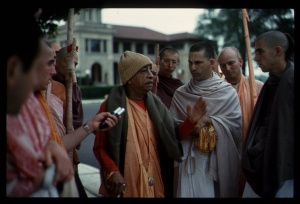SB 4.11.32: Difference between revisions
m (1 revision(s)) |
(Vanibot #0054 edit - transform synonyms into clickable links, which search similar occurrences) |
||
| (One intermediate revision by one other user not shown) | |||
| Line 1: | Line 1: | ||
{{info | {{info | ||
|speaker=Svāyambhuva Manu | |speaker=Svāyambhuva Manu | ||
|listener=King Dhruva | |listener=King Dhruva | ||
}} | }} | ||
[[Category:Srimad-Bhagavatam - Canto 04 Chapter 11]] | |||
[[Category:Bhagavatam Verses Spoken by Svayambhuva Manu - Vanisource|041132]] | |||
<div style="float:left">'''[[Srimad-Bhagavatam]] - [[SB 4|Fourth Canto]] - [[SB 4.11: Svayambhuva Manu Advises Dhruva Maharaja to Stop Fighting|Chapter 11: Svāyambhuva Manu Advises Dhruva Mahārāja to Stop Fighting]]'''</div> | |||
<div style="float:right">[[File:Go-previous.png|link=SB 4.11.31]] '''[[SB 4.11.31]] - [[SB 4.11.33]]''' [[File:Go-next.png|link=SB 4.11.33]]</div> | |||
{{RandomImage}} | |||
==== TEXT 32 ==== | ==== TEXT 32 ==== | ||
<div | <div class="verse"> | ||
yenopasṛṣṭāt puruṣāl | :yenopasṛṣṭāt puruṣāl | ||
loka udvijate bhṛśam | :loka udvijate bhṛśam | ||
na budhas tad-vaśaṁ gacched | :na budhas tad-vaśaṁ gacched | ||
icchann abhayam ātmanaḥ | :icchann abhayam ātmanaḥ | ||
</div> | </div> | ||
| Line 16: | Line 22: | ||
==== SYNONYMS ==== | ==== SYNONYMS ==== | ||
<div | <div class="synonyms"> | ||
''[//vanipedia.org/wiki/Special:VaniSearch?s=yena&tab=syno_o&ds=1 yena]'' — by which; ''[//vanipedia.org/wiki/Special:VaniSearch?s=upasṛṣṭāt&tab=syno_o&ds=1 upasṛṣṭāt]'' — being overwhelmed; ''[//vanipedia.org/wiki/Special:VaniSearch?s=puruṣāt&tab=syno_o&ds=1 puruṣāt]'' — by the person; ''[//vanipedia.org/wiki/Special:VaniSearch?s=lokaḥ&tab=syno_o&ds=1 lokaḥ]'' — everyone; ''[//vanipedia.org/wiki/Special:VaniSearch?s=udvijate&tab=syno_o&ds=1 udvijate]'' — becomes terrified; ''[//vanipedia.org/wiki/Special:VaniSearch?s=bhṛśam&tab=syno_o&ds=1 bhṛśam]'' — greatly; ''[//vanipedia.org/wiki/Special:VaniSearch?s=na&tab=syno_o&ds=1 na]'' — never; ''[//vanipedia.org/wiki/Special:VaniSearch?s=budhaḥ&tab=syno_o&ds=1 budhaḥ]'' — a learned person; ''[//vanipedia.org/wiki/Special:VaniSearch?s=tat&tab=syno_o&ds=1 tat]'' — of anger; ''[//vanipedia.org/wiki/Special:VaniSearch?s=vaśam&tab=syno_o&ds=1 vaśam]'' — under the control; ''[//vanipedia.org/wiki/Special:VaniSearch?s=gacchet&tab=syno_o&ds=1 gacchet]'' — should go; ''[//vanipedia.org/wiki/Special:VaniSearch?s=icchan&tab=syno_o&ds=1 icchan]'' — desiring; ''[//vanipedia.org/wiki/Special:VaniSearch?s=abhayam&tab=syno_o&ds=1 abhayam]'' — fearlessness, liberation; ''[//vanipedia.org/wiki/Special:VaniSearch?s=ātmanaḥ&tab=syno_o&ds=1 ātmanaḥ]'' — of the self. | |||
</div> | </div> | ||
| Line 23: | Line 29: | ||
==== TRANSLATION ==== | ==== TRANSLATION ==== | ||
<div | <div class="translation"> | ||
A person who desires liberation from this material world should not fall under the control of anger because when bewildered by anger one becomes a source of dread for all others. | A person who desires liberation from this material world should not fall under the control of anger because when bewildered by anger one becomes a source of dread for all others. | ||
</div> | </div> | ||
| Line 30: | Line 36: | ||
==== PURPORT ==== | ==== PURPORT ==== | ||
<div | <div class="purport"> | ||
A devotee or saintly person should not be dreadful to others, nor should anyone be a source of dread to him. If one treats others with nonenmity, then no one will become his enemy. There is the example, however, of Jesus Christ, who had enemies, and they crucified him. The demonic are always present, and they find fault even in saintly persons. But a saintly person never becomes angry, even if there is very great provocation. | A devotee or saintly person should not be dreadful to others, nor should anyone be a source of dread to him. If one treats others with nonenmity, then no one will become his enemy. There is the example, however, of Jesus Christ, who had enemies, and they crucified him. The demonic are always present, and they find fault even in saintly persons. But a saintly person never becomes angry, even if there is very great provocation. | ||
</div> | </div> | ||
__NOTOC__ | |||
<div style="float:right; clear:both;">[[File:Go-previous.png|link=SB 4.11.31]] '''[[SB 4.11.31]] - [[SB 4.11.33]]''' [[File:Go-next.png|link=SB 4.11.33]]</div> | |||
__NOTOC__ | |||
__NOEDITSECTION__ | |||
Latest revision as of 21:19, 18 February 2024

A.C. Bhaktivedanta Swami Prabhupada
TEXT 32
- yenopasṛṣṭāt puruṣāl
- loka udvijate bhṛśam
- na budhas tad-vaśaṁ gacched
- icchann abhayam ātmanaḥ
SYNONYMS
yena — by which; upasṛṣṭāt — being overwhelmed; puruṣāt — by the person; lokaḥ — everyone; udvijate — becomes terrified; bhṛśam — greatly; na — never; budhaḥ — a learned person; tat — of anger; vaśam — under the control; gacchet — should go; icchan — desiring; abhayam — fearlessness, liberation; ātmanaḥ — of the self.
TRANSLATION
A person who desires liberation from this material world should not fall under the control of anger because when bewildered by anger one becomes a source of dread for all others.
PURPORT
A devotee or saintly person should not be dreadful to others, nor should anyone be a source of dread to him. If one treats others with nonenmity, then no one will become his enemy. There is the example, however, of Jesus Christ, who had enemies, and they crucified him. The demonic are always present, and they find fault even in saintly persons. But a saintly person never becomes angry, even if there is very great provocation.